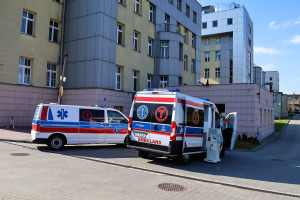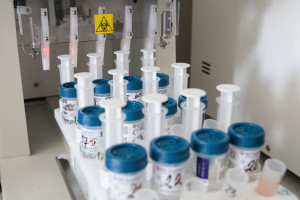There is a counterproposal to lowering prices for robotic procedures in prostate cancer

- During the last meeting of the Parliamentary Permanent Subcommittee on Oncology, the main topic was prostate cancer.
- The number of new prostate cancer diagnoses currently stands at approximately 24,000 cases per year. In 2024, the National Health Fund (NFZ) allocated PLN 1.8 billion out of a total of PLN 26.5 billion for cancer treatment.
- In 2024, expenditure on radical prostatectomy amounted to PLN 406 million, with over PLN 278 million being financed for robotic surgery
- We received the news of the reduction in the cost of robotic procedures with great concern. This will lead to a reduction in the number of these procedures in favor of methods we consider inferior. The risk of erectile dysfunction and urinary incontinence will be higher," said Professor Tomasz Szydełko.
- The first problem we face in the case of prostate cancer is early detection, and in this case it is completely different than in all other cancers - said Deputy Minister of Health Urszula Demkow at the meeting of the Parliamentary Permanent Subcommittee for Oncology
"Detection and monitoring using PSA is not widely recognized as screening worldwide because it does not prolong life and instead leads to overdiagnosis. Therefore, it is crucial that a patient with an elevated PSA level receives a consultation with a urologist and that they jointly determine the course of action," she pointed out.
As she reminded, a patient with suspected prostate cancer should undergo a multiparametric magnetic resonance imaging scan, which will confirm the disease and show its stage of advancement, so the availability of this test is important.
She added that if there are indications for collecting biopsies from the senile tumor, a modern tool such as a fusion biopsy should be used, and if the disease is disseminated, bone scintigraphy is considered. A very reliable periodic test is PET-PSMA. Furthermore, men with a family history of prostate cancer should consider genetic testing for BRCA1/2 gene mutations.
National Health Fund on treatment expenses"As you can see, diagnosing prostate cancer is difficult and complicated, based on successive steps, each of which carries a decision. If the cancer is confined to the organ, the patient can be operated on using one of three techniques: classical surgery, laparoscopy, or robotic surgery, with the addition of radiotherapy or brachytherapy. If the cancer has spread, four lines of therapy are available, including immunotherapy and PARP inhibitor therapy. Doctors treating metastatic prostate cancer currently have a large number of effective tools at their disposal," said the Deputy Minister of Health.
Filip Urbański, director of the Department of Analysis, Quality Monitoring and Optimization of Services at the National Health Fund Headquarters, announced that in 2024 the National Health Fund allocated a total of PLN 26.5 billion for oncological treatment, of which PLN 1.8 billion was spent on the treatment of prostate cancer .
"At the same time, we are observing a rising incidence of this cancer. In 2023, nearly 24,500 new diagnoses were recorded ," he noted.
"Over the last five years, the observed treatment structure has also changed. In 2019-21, 31% of newly diagnosed patients received surgical treatment. In 2022, this figure rose to 36% , and in 2023 – 42%. Regarding radiotherapy, the percentage of patients in 2019-22 remained at around 24%. In 2023, it decreased to 22%, " said Director Urbański.
As he pointed out, in 2022, the National Health Fund spent PLN 157 million on radical prostatectomy. In 2024, this amounted to PLN 406 million , with over PLN 278 million financing robotic surgery . In terms of spending on drug programs, in 2021, this amounted to approximately PLN 250 million . In 2024, it was over PLN 422 million .
Lower prices for robotic procedures. "Risks for patients are increasing."Prof. Tomasz Szydełko, national consultant in the field of urology, addressed the problem of lower prices for robotic procedures.
"Patients fear complications of surgical treatment, such as urinary incontinence or erectile dysfunction. For several years now, we have been able to offer patients surgeries using the most precise method, using a surgical robot. This allows many patients to maintain their potency and urinary continence," he reminded.
"The medical community has received the news of the reduction in the pricing of robotic procedures with great concern, as it is likely that this will lead to a reduction in the number of these procedures in favor of methods we consider inferior. In such a case, the risk of erectile dysfunction or urinary incontinence will be greater," he said.
"Of course, we understand that the price reduction is intended to reduce costs. However, we have repeatedly proposed lowering them, raising the issue of the need to perform diagnostic tests for low-risk patients, including scintigraphy —an isotope test to detect possible bone metastases," explained the national consultant.
" There are no indications to perform scintigraphy in these patients, yet it is a requirement because without scintigraphy, we cannot bill a patient undergoing robotic surgery. This wastes much-needed money in the system because this test is performed unnecessarily," the expert emphasized.
Prof. Szydełko indicated that he had already sent a letter on this matter to the Ministry of Health and was waiting for the ministry's position.
Copyrighted material - reprint rules are specified in the regulations .
rynekzdrowia












